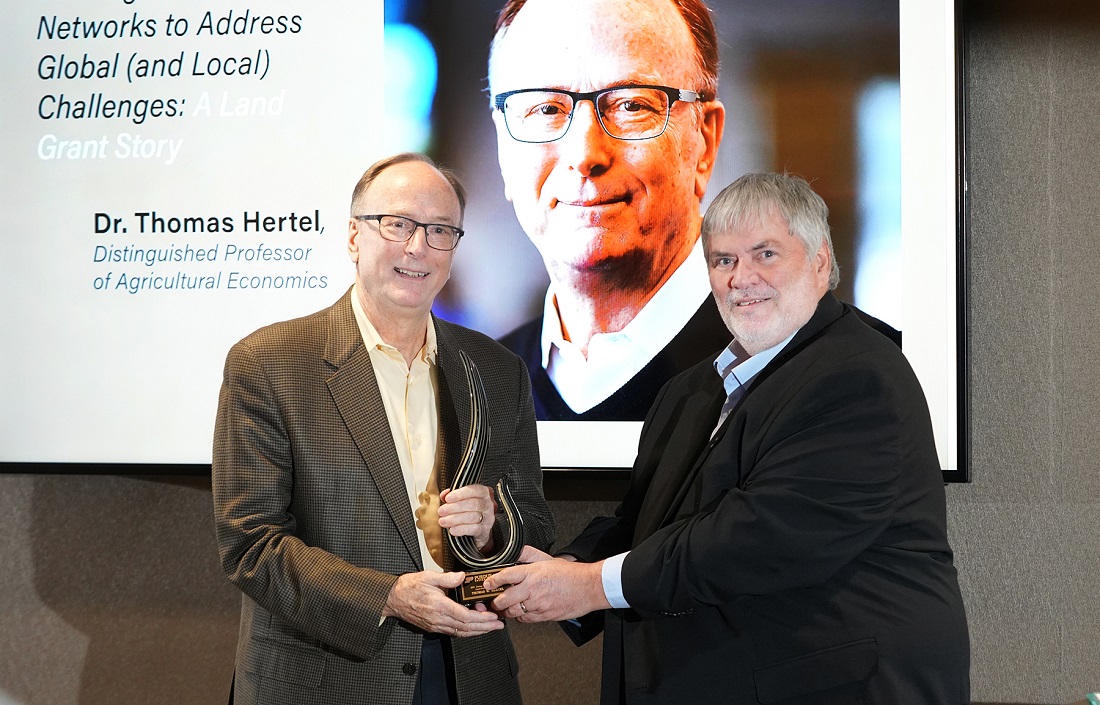Ag economist Tom Hertel receives Spirit of Land-Grant Mission Award
How deep are Tom Hertel’s land-grant ties? His grandfather started the agricultural economics department at New York’s land-grant university, Cornell. Robert Thompson, former dean of Purdue’s College of Agriculture, was a dinner guest at Hertel’s childhood home. Those are just two steps on a long path that led to the Purdue agricultural economics professor receiving the 2023 Spirit of the Land-Grant Mission Award.
“It’s the most important award I’ll ever receive,” Hertel says of the honor, since 2016 named for the late Corinne Alexander, an agricultural economics professor. His land-grant perspective was sharpened during a conversation with a mentor at Princeton, where he earned a master’s degree. “I had an idea for an agriculture project in Africa. The professor remarked: ‘Why are you working on agriculture? Just let them all move to the city.’” That is when I realized that Princeton was not a land-grant institution!
“And that’s where I started retracing my steps back to my roots.”
A key figure on his path back to the land-grant system was Purdue legend Lowell Hardin, who interrupted a 55-year Purdue career by earning an international reputation during 16 years as senior agriculturalist at the Ford Foundation. He hired Hertel there, guided him back to get a PhD, and later advised him to consider an opening at Purdue. “He is the land-grant thread for me, absolutely,” says Hertel, who came to Purdue in 1983. The university’s “entrepreneurial spirit” is one reason he stayed.
“A lot of places, you bring up a new idea and the administration’s first inclination is to find ways to kill it,” he says. “It was the opposite at Purdue. They cleared the decks of administrative hurdles. That’s something I’ve always appreciated.”
In 1992 he founded GTAP, the Global Trade Analysis Project. It’s hard to overstate its influence: More than 28,000 people in the network, 179 countries involved – and even a GTAP University. The work has moved beyond trade agreements; now environmental issues are a major focus.
“We continue to position ourselves at the frontier of global economic analysis,” Hertel says. “GTAP is a publicly funded project based in academia. We’ve developed a reputation for unbiased research. We just want the best science, the best data, the best modeling, the best analysis. We strive to lift up the whole GTAP community, and we have been able to attract very good people.”
Will Martin, a senior research fellow with the International Food Policy Research Institute, says Hertel “showed management skills of a high order” while developing the GTAP project. “The database that the consortium builds is now the overwhelming choice of modelers dealing with global economic problems. Without it, the world would have much less reliable assessments of the consequences of some of the most challenging policy problems.”
Hertel hasn’t been involved in GTAP’s day-to-day operations for nearly a decade. “I’m kind of a figurehead, a source of institutional memory and advice,” he says. “GTAP is in position to be successful well beyond my own career at Purdue.”
Hertel is currently the principal investigator for a new National Science Foundation program: GLASSNET, a network of 11 networks – GTAP is one of the 11 – working on sustainability issues, primarily focused on land and water. “Obviously agriculture plays a big role there,” he says.We are focused on respecting the earth’s planetary boundaries – biodiversity, nitrogen, groundwater, greenhouse gas emissions. That is what keeps me up at night – thinking about potential solutions. Finding these solutions will require interdisciplinary, international collaboration. And we must do a better job communicating our findings to the public.
- Tom Hertel, Spirit of Land Grant Mission Award Recipient






